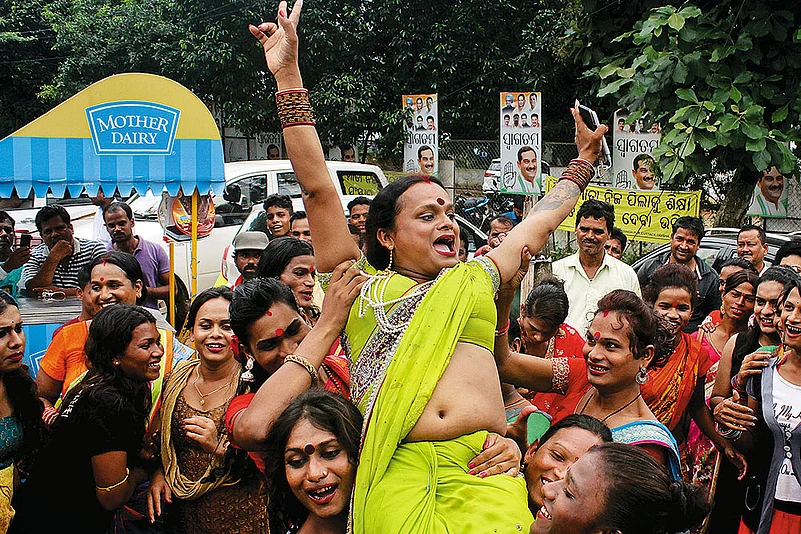“Fortunately, the petitioner may be saved of any further pathos since the learned government pleader informs this court that the police authorities have talked to the family of late Manu and that, though they are not in agreement of his mortal remains being handed over to the petitioner, they have no objection in him taking part in his last life and obsequies, which is to be held at their hometown at Payyavoor, Kannur.”
Battles Won, Wars Yet To Be Fought
Despite major setbacks in courtrooms, the queer movement will soldier and ultimately win because it is quintessentially a battle for love and to live with dignity

With these words, Justice Devan Ramachandran disposed of a writ petition filed by Jebin Joseph, a 27-year-old gay man who claimed the dead body of his live-in partner. The family of the deceased partner had earlier refused to claim the body until the hospital bills were settled since the partner, Manu, died in mysterious conditions. When the community and friends collected the money and paid it off, the family staked claim. Yet, Jebin, who had been Manu’s only family when he came out, was not given custody of his remains but had to be satisfied with mere presence at the funeral instead of being allowed to carry out the funeral rites.
The reason for this was simple: Jebin and Manu were not married, nor was their marriage recognised under Indian law. Indian law recognises familial rights, and associations by three modes: blood, adoption, and marriage. That is exactly what queer persons were fighting for in the Supreme Court last year. The court, unfortunately, refused those claims. In its judgement in Supriyo Chakraborty v. Union of India, a five-judge Constitution Bench of the Supreme Court had held that there is no fundamental right to marriage recognised under the Constitution, and thus, the lack of recognition of non-heterosexual marriages by law under the Special Marriage Act, 1954, is permissible discrimination.
Marriage, as an institution, will not lead to queer liberation. It will recreate the inequalities based on class, caste, gender, religion, and disability
The judgement, running into over 350 pages waxed eloquent over the struggles of queer people. But little else. The cases of discrimination, familial violence, of being barred from being with their partners…none of it could move the court to grant marriage and adoption rights to queer people. To say that the judgement was disappointing, not just as a queer person but also as one of the lawyers who worked on the case, is an understatement. The majority view was that while that, “There is no difficulty about the right of two consenting persons to decide to live together, to co-habit with each other, and create their unique idea of a home, unconstrained by what others may say... The liberative effect of Section 377 being read down is that two individuals, regardless of their sexual orientation are enabled to live together, with dignity, and also protected from any kind of violence, for living and existing together. Therefore, the right to be left alone, the right to exercise choice, the right to dignity, and to live one’s life, with the person of one’s choice, is an intrinsic and essential feature of Article 21 of the Constitution.” In the same judgement, the majority allowed transgender persons in heterosexual marriages to get married, and that was the only silver lining in the judgement.

Some petitions also raised the issue of adoption, and the matter was argued at length in some arguments, including those of Amritananda Chakravarty, Menaka Guruswamy, and others. Unlike marriage, which was rejected unanimously by all five judges, two judges, Justices Kaul and Chandrachud, allowed adoption, while Justices Bhat, Kohli, and Narsimha rejected the claim. Review petitions have already been filed, asking the court to review the judgement. They will be taken up someday, and the battle will continue.
Since then, there have been multiple judgements in South Asia, most notably in Nepal and Japan, which have recognised queer marriages. The first lesbian couple in Nepal, Dipti and Suprita, recently registered their marriage, making Nepal the first country to recognise and register a non-heterosexual marriage. In Japan, a court in Sapporo held that “Living in accordance with one’s gender identity and sexual orientation is an inalienable right rooted in important personal interests” and said that it hoped that the government would pass a law recognising same-sex marriages and even acknowledged the broad public support it enjoyed. It struck down the ban on non-heterosexual marriage in Japanese civil codes as unconstitutional and discriminatory.
Now is the time to acknowledge and analyse why we lost the battle, regroup, and then fight back so that we can win the war against discrimination
Much has been written about the flaws in the judgement and its effect on queer rights and queer movements in India, so I do not wish to spill more ink on it. We have spent the past few months licking our wounds. Now is the time to acknowledge and analyse why we lost the battle, regroup, and then fight back so that we can win the war against discrimination. I want to talk about what should we, the (queer) people of India, do to create and fulfil the Constitutional promise of equality.
However, social revolutions do not happen solely inside courts. The queer movement needs to campaign on the streets, in elections, and in public for the causes of its people. There has been some complacency among some of us, and I count myself among those who believe that the courts will deliver equality to us. As Robin Gorna notes in the anthology titled The Revolution Will Not Be Litigated, “the best social movements connect the head—evidence, research, legal arguments—with the heart: identity, emotions, true connection. Of course, movements need the law because people need the law to protect our dignity and support our freedom. Similarly, the law needs movements: if there is no demand for change and no stories of how the law fails, then the law just sits there. What rings in my ears are Jonny’s words as we left our caffeine-fuelled fight in 2018: “Law and movements, it’s all about the ‘and’, isn’t it? It’s a bit of both.”
But let me return to the issue of marriage.Marriage, as an institution, will not lead to queer liberation. It will recreate the inequalities based on class, caste, gender, religion, and disability. But I saw this case as a cause for equality, which is why I will continue to advocate for it inside and outside the courtroom.We lost the case, but we must not lose our morale. There are countless other causes that we must continue to advocate for: horizontal reservations for transgender persons, anti-bullying law, repealment of the Transgender Persons (Protection of Rights) Act, 2019 and access to queer affirmative, affordable and accessible healthcare. Our love, our queerness, and our resistance will ultimately win, but until then, we must continue to fight. The future will belong to the pariahs, the future will be queer. We will win because our fight is fuelled by the bitterness of oppression, by the thirst to love and be loved, and we will create a new layer of this palimpsest which will sing the ballads of our victory over queerphobia.
The author is a lawyer and queer rights activist
-
Previous Story
 India Bids Farewell To Ratan Tata; Last Rites Held In Mumbai With State Honours
India Bids Farewell To Ratan Tata; Last Rites Held In Mumbai With State Honours - Next Story


















